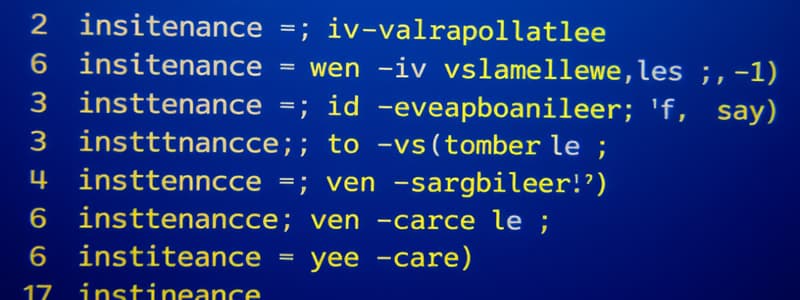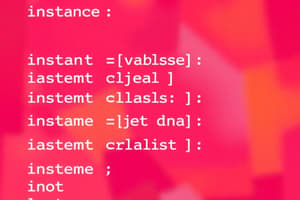Podcast
Questions and Answers
What do instance variables do?
What do instance variables do?
- Control program flow
- Specify methods of a class
- Manage user inputs
- Store the data of an object (correct)
What is an instance of a class?
What is an instance of a class?
An object of the class
What is an instance variable?
What is an instance variable?
A storage location present in each object of the class
What does the class declaration specify?
What does the class declaration specify?
What do an object's instance variables store?
What do an object's instance variables store?
What consists of an instance variable declaration?
What consists of an instance variable declaration?
You should declare all instance variables as __________.
You should declare all instance variables as __________.
Each object of a class has its own set of instance __________.
Each object of a class has its own set of instance __________.
What is encapsulation?
What is encapsulation?
How can you encapsulate data?
How can you encapsulate data?
What does encapsulation allow programmers to do?
What does encapsulation allow programmers to do?
What is information hiding?
What is information hiding?
What is the purpose of instance variable declarations?
What is the purpose of instance variable declarations?
What is the role of a constructor?
What is the role of a constructor?
The name of the __________ is always the same as the name of the class.
The name of the __________ is always the same as the name of the class.
A constructor that takes no arguments is called a __________ constructor.
A constructor that takes no arguments is called a __________ constructor.
The constructors and methods of a class go __________ the class declaration.
The constructors and methods of a class go __________ the class declaration.
What forms the public interface of a class?
What forms the public interface of a class?
What is javadoc?
What is javadoc?
What are @param tags used for?
What are @param tags used for?
@return tags are used for?
@return tags are used for?
When commenting, you need to provide comments for?
When commenting, you need to provide comments for?
How can you empty the harrysChecking bank account using public interface methods?
How can you empty the harrysChecking bank account using public interface methods?
What is wrong with the statement: BankAccount harrysChecking = new BankAccount(10000); System.out.println(harrysChecking.withdraw(500));
What is wrong with the statement: BankAccount harrysChecking = new BankAccount(10000); System.out.println(harrysChecking.withdraw(500));
How would you change the public interface to accommodate an account number?
How would you change the public interface to accommodate an account number?
Why is the following documentation comment questionable? public int getAccountNumber()
Why is the following documentation comment questionable? public int getAccountNumber()
What does the private implementation of a class consist of?
What does the private implementation of a class consist of?
What is the job of a constructor?
What is the job of a constructor?
Flashcards are hidden until you start studying
Study Notes
Instance Variables and Classes
- Instance variables store the data specific to an object, unique to each instance of a class.
- Every object of a class has a separate set of instance variables, ensuring data encapsulation.
- Declaring instance variables as private enhances encapsulation, restricting direct access from outside the class.
Class Declaration
- Class declaration defines the instance variables and their types.
- A well-defined class includes public methods to manipulate its private instance variables.
Encapsulation
- Encapsulation hides the implementation details of a class while providing access through public methods.
- Information hiding simplifies error tracing and allows for easier modifications within the class.
Method Behavior
- Methods such as
public void unclick()can manipulate instance variables to ensure class functionality. - To access private instance variables (like hours and minutes in a Clock class), invoke public methods.
Constructor Basics
- Constructors initialize instance variables when an object is created; a no-argument constructor sets default values (e.g., zero).
- The constructor’s name matches the class name, serving as an entry point for object instantiation.
Public Interface
- The public interface of a class consists of public constructors and method declarations.
- Proper documentation (javadoc) is essential for methods to clarify their purpose, parameters, and return values.
Bank Account Example
- In designing a BankAccount class, interactions occur through public methods, e.g.,
harrysChecking.withdraw(harrysChecking.getBalance()). - Enhancements to the class can include additional parameters (like account number) to enrich its representation without frequent updates.
Documentation Best Practices
- Documentation comments should accurately describe methods and constructors, ensuring users understand their functionalities.
- Misleading or vague comments can cause confusion about method purposes and expected behavior.
Implementation Details
- The private implementation of a class includes instance variables and method bodies, which are shielded from external access.
- Constructors play a crucial role in setting initial values for instance variables, maintaining the integrity of the object state.
Studying That Suits You
Use AI to generate personalized quizzes and flashcards to suit your learning preferences.




